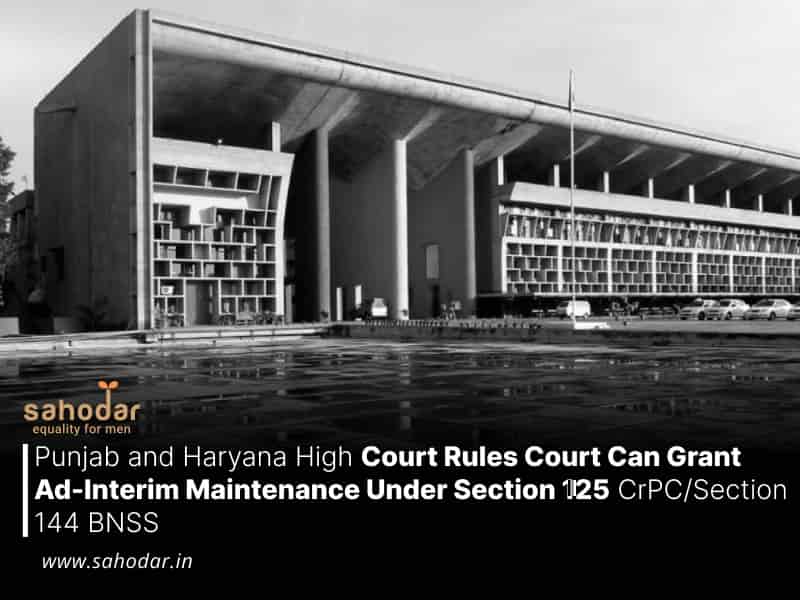However, the Court said such ad-interim maintenance must be granted only in exceptional cases.
The Punjab and Haryana High Court recently ruled that a court can grant ad-interim maintenance, including through an ex-parte order, under Section 125 CrPC or Section 144 of the newly enacted Bharatiya Nagarik Suraksha Sanhita (BNSS), which has replaced the CrPC.
Justice Sumeet Goel noted that while the statute does not specifically mention ad-interim or provisional maintenance, there is no restriction against it.
“The Court would have power to grant ad-interim maintenance including ex-parte ad-interim maintenance as firstly such power can well be construed to be an implied/ancillary power vested in the Court; secondly such interpretation would further the salubrious objective behind enacting the statute,” the single-judge said.
However, the Court also warned that ad-interim maintenance should be granted only in exceptional cases.
It also stated that the party seeking ad-interim maintenance must file an affidavit detailing their assets and liabilities to support their request.
“It goes without saying that the exercise of power by a Court to grant ad-interim maintenance/ex-parte ad-interim maintenance shall be in accordance with the well established principles of judicial discretion and equity. No exhaustive set of guideline(s) to govern such power can possible be laid-down, however alluring this aspect may be,” it added.
The Court was reviewing a revision petition challenging a family court’s order that required a man to pay ₹15,000 per month in provisional maintenance to his wife and child.
The husband’s lawyer argued that there was no legal requirement for granting ad-interim or provisional maintenance while an application for interim maintenance under Section 125 CrPC was pending.
In contrast, the wife’s lawyer argued that the provisional maintenance was intended to assist them during the waiting period for the decision on the interim maintenance application.
The Court reviewed the provisions thoroughly and concluded that a father or husband cannot neglect his responsibilities towards his family.
“In interpreting law of a kind, as Section 125 of Cr.P.C., 1973/Section 144 of BNSS, 2023 is, the Court must not only proceed on the dictionary or etymological meaning assigned to words employed by legislature but dispense justice by keeping in mind, at all times, not only the legal obligations but also moral and social obligations of a husband/father qua his wife/children. Instead of being fettered by sheer technicalities, it would be paramount to keep in view the interest(s) of wife/child,” the Court said.
The Court noted that, according to the statutory provision, a request for interim maintenance must be decided within 60 days of the notice.
Explaining ad-interim relief, the Court described it as an urgent, temporary measure.
In the context of Section 125 CrPC and Section 144 BNSS, the Court provided examples of situations where ad-interim maintenance might be necessary.
“There may be a case, where wife/child who is suffering from prolonged illness, may be required to be given immediate medical assistance/treatment and such person may not be able to meet such expense(s). Therefore, an urgent need may arise for immediate medical assistance/treatment & the wife/child may not be able to survive to obtain and/or reap the fruits of an order passed by the Court after few months without being provided an ex-parte ad-interim maintenance order/ad-interim maintenance order. There may also be an instance wherein the child cannot be sent to school for want of money. That the wife/child, in case of succeeding, will be entitled to arrears is neither any consolation nor a cause/source of solace for them.”
The Court concluded that, given the nature and framework of the statutory provision, it is clear that the Court has been implicitly granted ancillary or incidental powers when the facts or circumstances of a case justify it.
In this case, the Court observed that the order for ad-interim maintenance was issued after the maintenance application had been pending for eight months.
The single-judge noted that the family court should not have issued an order for ad-interim maintenance and instead should have provided a reasoned decision on the interim maintenance application itself.
The Court also found that there were no compelling or significant circumstances presented to justify the ad-interim maintenance order.
As a result, the Court overturned the family court’s order and instructed it to make a decision on the interim maintenance application within six weeks.
Advocate Parmod Kumar Chauhan represented the petitioner.
Advocates Akash Khurcha and Murari Tiwari represented the respondents.

